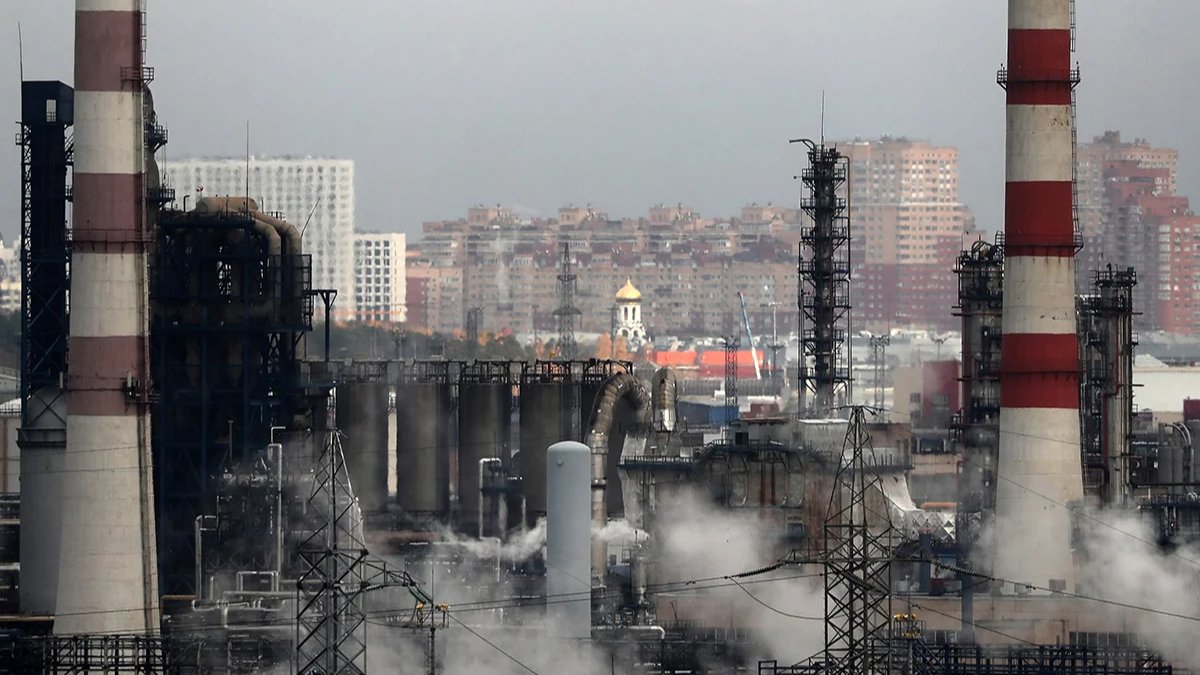Alongside China and Saudi Arabia, Russia has traditionally acted as the main brake on global initiatives to combat climate change, and the recent COP28 in Dubai was no exception, with the Russian delegation expressing its fundamental opposition to the abandonment of fossil fuels — the conference’s stated aim — ahead of its arrival.
How is it that after almost 30 years of discussions at the UN and the publication of thousands of studies on climate change, Russia remains at the very bottom of the Climate Change Effectiveness Index (in 63rd place out of 67), and discussions about the climate crisis in the country are still dominated by questions about whether or not it’s real?
When Russian President Vladimir Putin addresses the climate crisis, he does so with non-science based scepticism, arguing that “changes in the Universe” might be the cause of global heating, and falling back on trite falsehoods such as the carbon emissions from volcanic eruptions dwarfing their man-made equivalent.
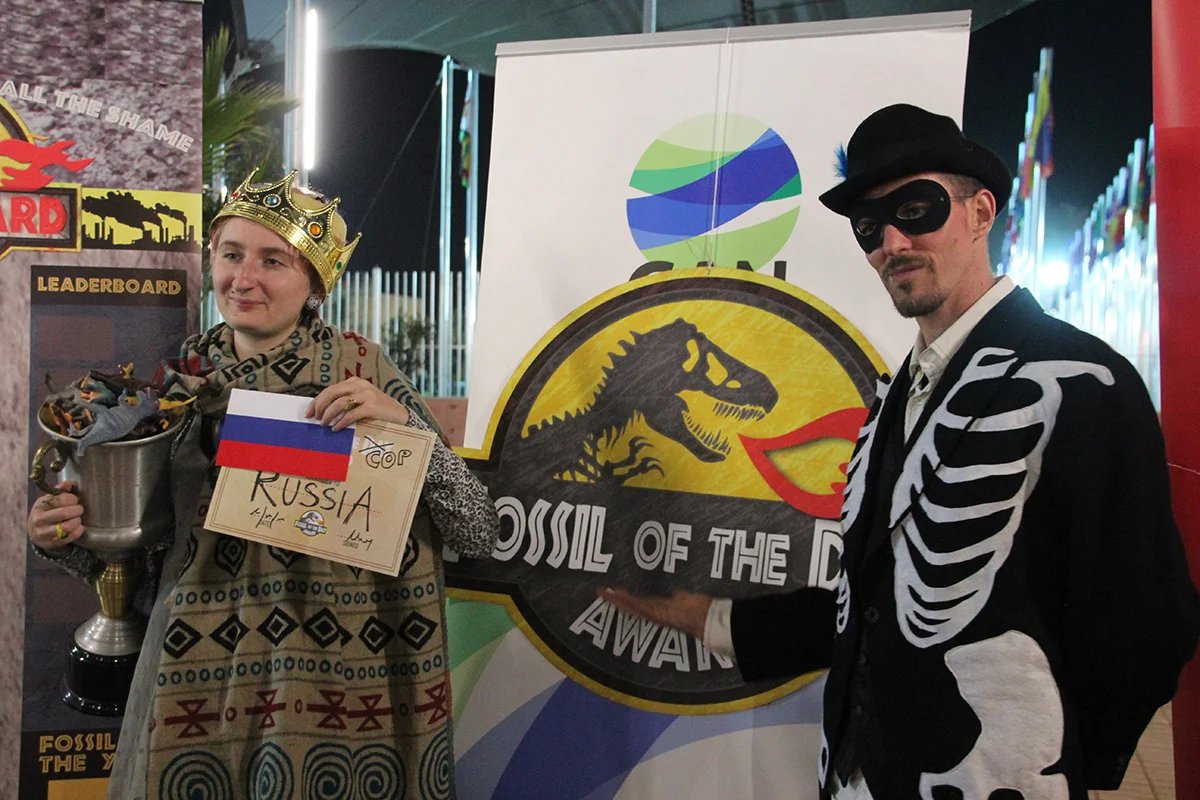
Russia receiving the “Fossil of the Day” award at COP22. Photo: John Englart / Flickr (CC BY-SA 2.0 DEED)
Russian politicians and officials for the most part have paid little attention to the climate crisis or have simply denied its existence. While it’s one thing for bodies representing business and industry to do that, it’s quite another when the country’s top scientific body does the same thing.
In 2018, the Russian Academy of Sciences publicly advised the authorities against signing the Paris Agreement “due to significant uncertainty in climate change assessments” and “the lack of consensus in global and Russian scientific communities about the causes of global warming.”
Incredibly, the conclusion of the Russian Academy of Sciences was not that consensus in the scientific community around climate change was lacking, but that ratifying the Paris Agreement “while under sanctions” could pose “strategic risks” by putting pressure on the economy and therefore represented “a threat to the national interests of the Russian Federation.”
While that’s exactly what abandoning fossil fuels would mean for a country whose entire economy is based on their exploitation, as scientists, the members of the academy must have understood that no other path to climate neutrality exists.
‘We’re sawing off the branch we’re sitting on’
Over 80% of Russian emissions come from its energy sector, which relies almost entirely on carbon-intensive fuels. There are no other major sources of revenue provided for in Russia’s development strategy, so it’s hardly surprising that Russian business is focused on expanding rather than abandoning its development of new oil, gas and coal deposits.
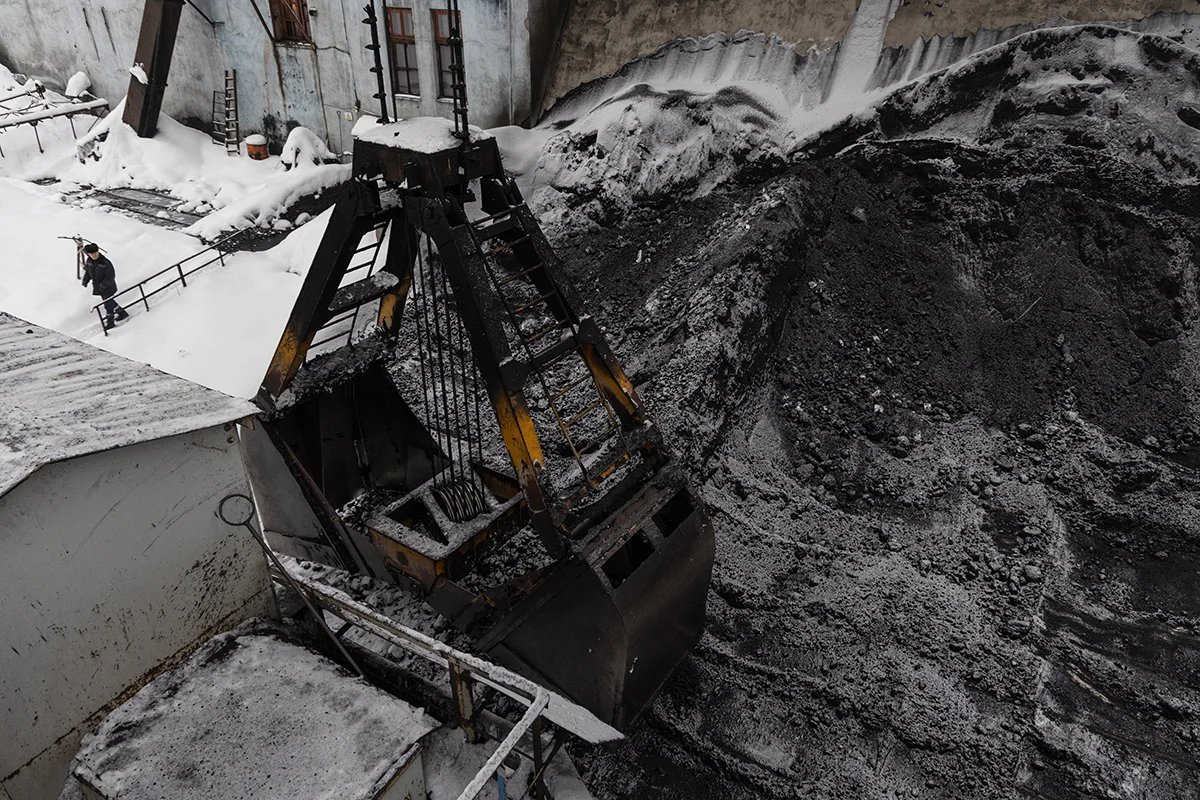
The Moscow Coke and Gas Plant. Photo: Andrey Rudakov / Bloomberg / Getty Images
Most efforts to combat the climate crisis in Russia are therefore undermined by the argument that protecting the economy should take precedence. “In Russia, since the 1990s, environmental policy has been perceived as a burden, and sometimes as a threat to economic development” researchers from Moscow’s Higher School of Economics wrote in 2021, arguing that such an approach was “short-sighted”.
While the transition away from fossil fuels to low-carbon energy is the basis of most countries’ climate strategies, Russia is not ready to voluntarily get off the needle, which has served to give the country weight in the international arena.
At the same time as the recommendation by the Russian Academy of Sciences not to sign the Paris Agreement in 2018, Sergey Mironov, the leader of the Just Russia party, warned Putin that ending Russia’s reliance on its natural hydrocarbon wealth would amount to “taking a saw to the branch we’re sitting on”.
Bananas in the tundra
The prospect of global heating in Russia has given rise to some rather optimistic assumptions: from lighthearted suggestions that one day bananas will grow in the tundra to more serious predictions that a quarter of Russian territory will eventually become suitable for crop cultivation. Seen from this angle, the thawing of the Siberian permafrost is seen as a positive development that will result in the spread of deciduous forests across northern Russia’s barren steppe.
Similarly, melting permafrost will leave the soil easier to drill, while receding ice will make previously inaccessible areas of the Arctic shelf ripe for the exploitation of oil, gas, rare earths and precious metals for the first time. The commercial development of the Arctic, following the disappearance of the Arctic sea ice, will also open up the Northern Sea Route — the shortest sea route between China and Europe — to non-icebreakers.
However, these arguments fail to take into account the far more destructive downside to global heating. Permafrost covers over 60% of Russian territory, and its melting will destroy or damage everything currently built on it, the economic consequences of which will be dire.
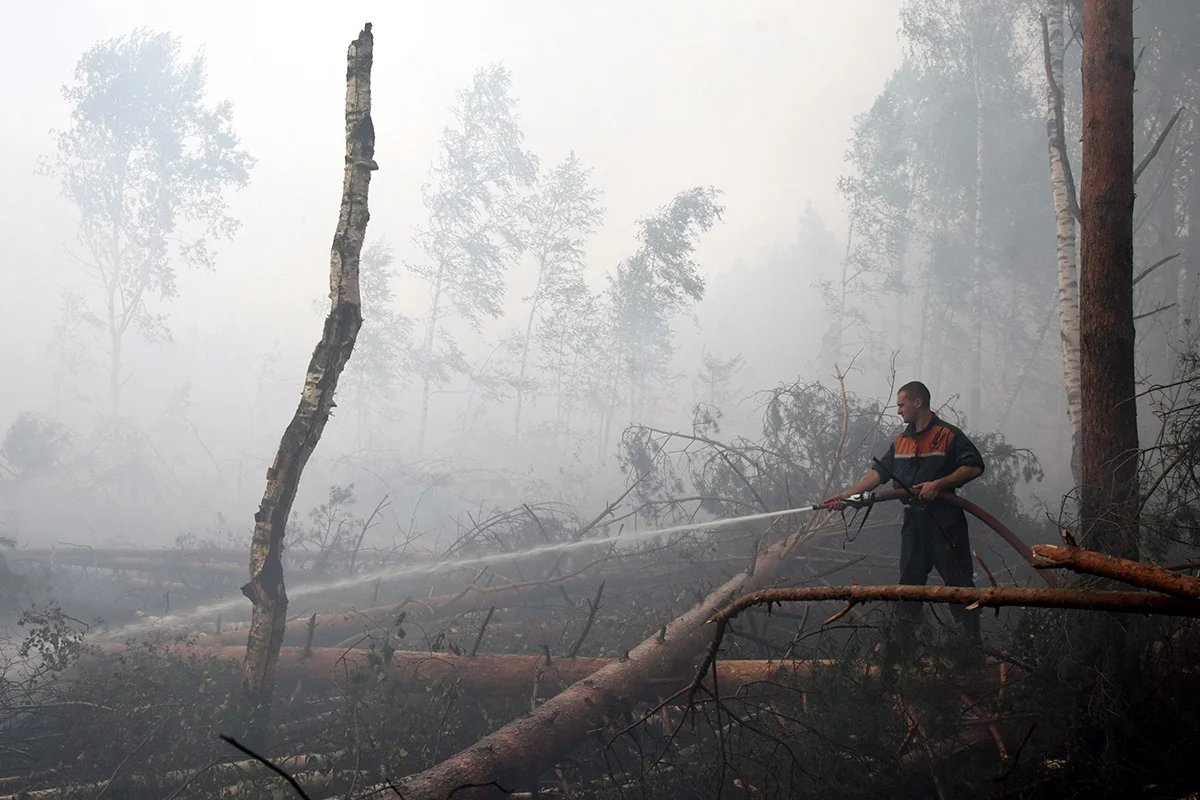
A Russian firefighter extinguishing a peat fire. Photo: Sergey Chirikov / EPA
Even more significantly, permafrost contains one and a half trillion tons of carbon, twice the amount that’s presently in the Earth’s atmosphere, which will gradually (and then not so gradually) be released as it melts. It also releases methane, a potent greenhouse gas that is far more effective than carbon dioxide at trapping heat. Unlike human emissions, these natural ones cannot be stopped once the speed of the permafrost melting reaches a certain point. At that point, a vicious cycle occurs in which the gases released from the permafrost as it melts contribute to further atmospheric heating that in turn accelerates the melting process.
Russia’s environmental monitor Roshydromet is already predicting the intensification and growing frequency of climate-change related natural disasters in Russia such as hurricanes, floods, droughts, forest fires, storm winds and heat waves. As for growing bananas in Siberia, any scenario in which that could happen would be one in which human beings had been wiped out.
Another more prosaic flaw in the optimism argument is its failure to take into account the fact that Russia’s northern soil is infertile. The country’s traditional southern breadbaskets however, are experiencing ever more frequent droughts. A 2010 study by the International Food Policy Research Institute proved comprehensively that rising temperatures and abnormal precipitation reduce agricultural output. In the forecast for Russia, researchers noted that by 2050 the country could lose up to 5 million hectares of arable land.
Empty promises
In 2020, Putin admitted that climate issues required “real action and serious attention,” and devoted an entire speech to the thawing of the permafrost and the desertification of agricultural land the following year. However, the state has yet to go beyond paying lip service to the problem.
Deciding for the sake of political expediency that it would be easier to sign the Paris Agreement than challenge it at a time when Russia was still banking on trade with the West, Russia eventually adopted (but has yet to ratify) the Paris Agreement in 2019.
In a 2020 decree that was an act of bad faith from the very start, Putin mandated the reduction of Russia’s greenhouse gas emissions to 70% of 1990 levels by 2030. What went conveniently unmentioned was that Russian emissions in 2020 were already far lower than those it produced in the last years of the Soviet Union, which meant that the target had already been more than met when the decree was signed, and even provided leeway for Russia to increase its emissions.
This year, Vladimir Putin approved an updated climate doctrine that recycled the disingenuous boast that Russia made a “significant contribution” to global emissions reductions in the 1990s. It also set a new target for Russia to attain carbon neutrality by 2060 — and this is where an even more egregious deceit can be found.
Further into the forest
Transitioning away from fossil fuels to achieve carbon neutrality is not envisaged by the doctrine. Instead, it proposes increasing the capacity for carbon absorption in forests and other ecosystems.
Put simply, by 2050, Russia plans to double its forests’ capacity for carbon absorption, to the bewilderment of the scientific community. As it is, forests and other ecosystems already absorb about half of all man-made carbon emissions, and science knows no way to double this figure. However, the ever cynical Russian authorities know that it’s sufficient to change the calculation methodology to make this happen.
A new calculation method proposed in 2021 by the Ministry of Natural Resources will — on paper, at least — reduce Russia’s greenhouse emissions by almost a third, and will see the country drop several places in the international ranking of greenhouse gas emitters. Russia will continue to support international climate initiatives as long as they in no way encroach on its own fossil fuel exploitation.
Science and conspiracy theories
Any interest in solving the climate crisis on Russia’s part ended the moment it invaded Ukraine last year. Salvaging the Russian economy is now the government’s sole article of faith, meaning any decarbonisation has been put on hold indefinitely.
The authorities persecute activists of all kinds, including those demanding action on the climate, and have systematically shut down the environmental nonprofits that once led the fight against climate change in Russia.
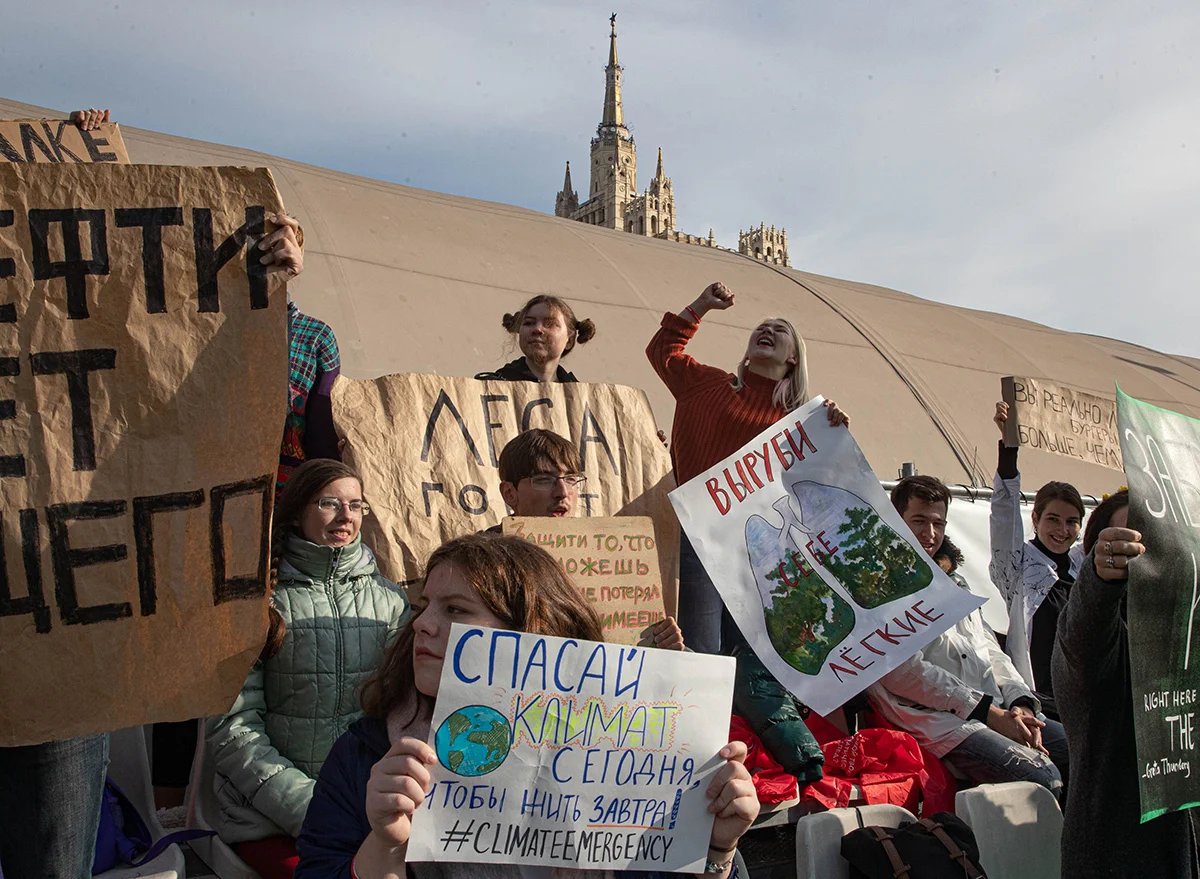
Greenpeace activists at the Global Climate Strike rally, Moscow, 27 September 2019. Photo: Sergey Ilnitsky / EPA
Corporations have taken the opportunity to do away with burdensome regulations in the absence of activist movements to stand in their way. Perhaps even more damaging are variations of a much-repeated conspiracy theory that the West is promoting the climate agenda as a way of undermining Russia’s development.
Such commentary has even spread to Russia’s scientific community. Geophysicist and member of the Academy of Sciences Leopol Lobkovsky has publicly stated he believes the “traditional” theory of climate change was invented for the sake of “humanity’s transition to a new world order, in which several countries will set their own rules of the game, citing climate.”
This paranoid approach is what earned Russia its last “Fossil of the Day” award, which was accompanied by a citation that called the Russian approach “so criminally self-centred that they decided energy transition and a focus on mitigation was a scam.”
For many zealots such as the far-right ultranationalist philosopher Alexander Dugin, this is the absolute truth. This is, after all, the man who said “If Soros believes that global warming is a threat, then this global warming is our ally.”
Until recently, dialogue with Russia in the name of fighting global heating was one of the few widely accepted reasons in the West for maintaining any dialogue whatsoever with the country. But Russia now has no time for such debates, as it’s busy waging war. As Russia draws a new Iron Curtain over its window to Europe in the face of potential climate disaster, any interest it once had in helping prevent the single greatest threat faced by humanity appears to have vanished.
Join us in rebuilding Novaya Gazeta Europe
The Russian government has banned independent media. We were forced to leave our country in order to keep doing our job, telling our readers about what is going on Russia, Ukraine and Europe.
We will continue fighting against warfare and dictatorship. We believe that freedom of speech is the most efficient antidote against tyranny. Support us financially to help us fight for peace and freedom.
By clicking the Support button, you agree to the processing of your personal data.
To cancel a regular donation, please write to [email protected]
